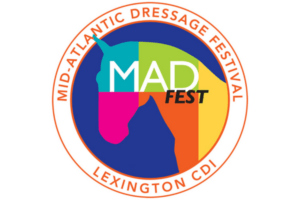Lake Worth, Fla. – Feb. 25, 2022 – The polo community gathered together on the evening of Friday, Feb. 18, to celebrate the 33rd annual Museum of Polo and Hall of Fame Induction and Awards Dinner Gala. On this milestone occasion, four horses and eight players were recognized for their memorable accomplishments in the world of polo.
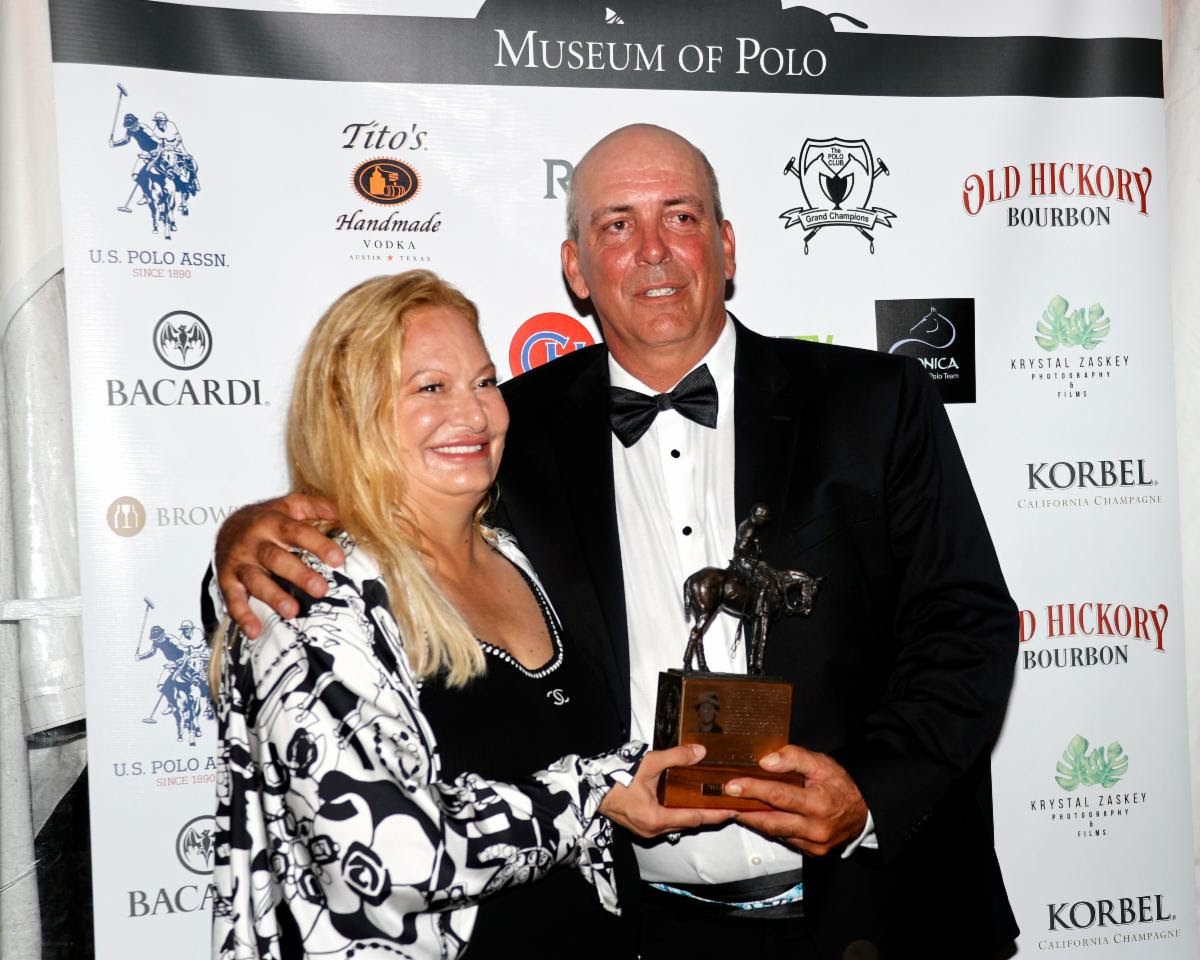
Upon arrival guests proceeded directly to a spectacular tent behind the Museum that was doubled in size to accommodate a record-breaking crowd. An hour of cocktails and passed hors d’oeurves kicked off the festivities with beverages provided courtesy of Wine and Spirits sponsors Robert S. Lipman, Margaret Lipman Orthwein, Lipman Brothers, LLC, Brown-Forman, Tito’s Handmade Vodka, Old Hickory Bourbon, Robert Hall Winery, Korbel Champagne and Bacardi USA.
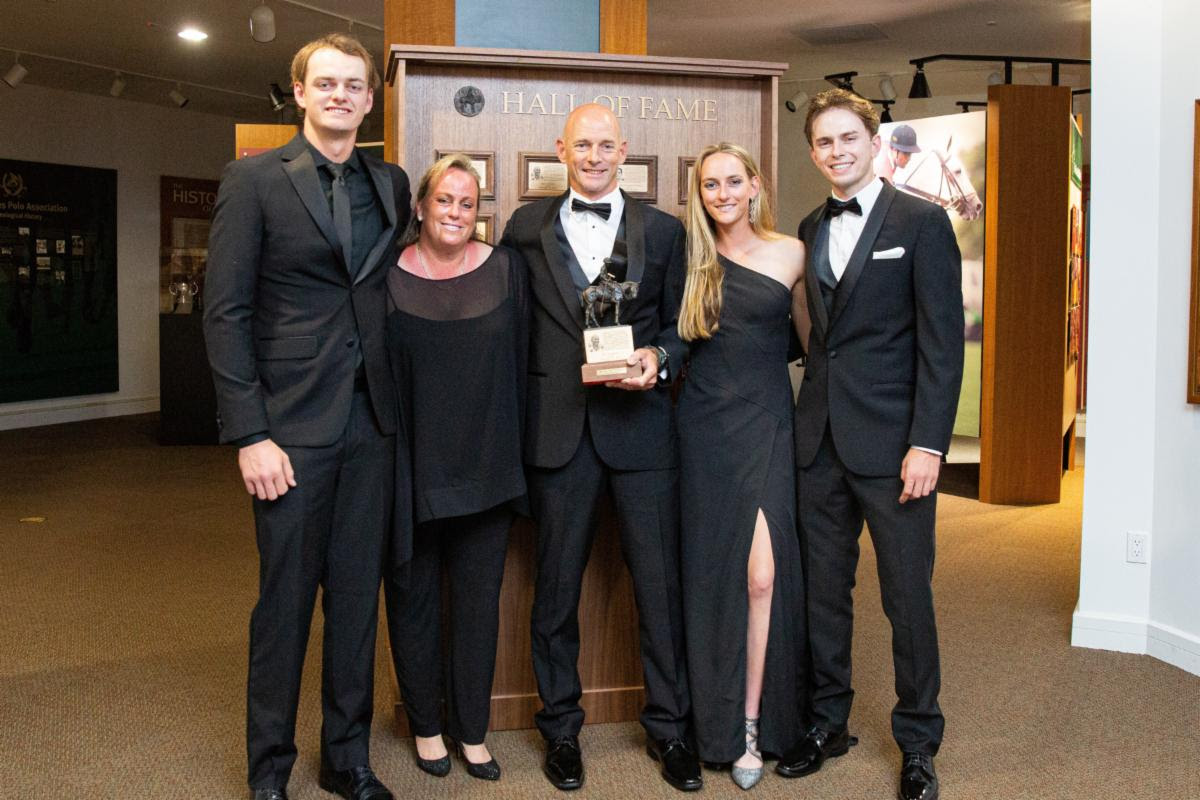
Photo by: Krystal Zaskey Photography
The Gala Dinner was thanks to the incredible support from sponsors Melissa and Marc Ganzi and Grand Champions Polo Club with additional major sponsorship from Ambassador Glen Holden, U.S. Polo Assn., Olexa Celine and the Robert I. Goldman Foundation, and Postage Stamp Farm Foundation. At the end of the evening guests were treated to Tito’s gift bags that included the annual Poloart giftbooks of artwork by Melinda Brewer and sponsored by the Iconica Foundation, Martin and Amanda Cregg and Steve Cox. Photography of the event and exhibit photography, film and social media support throughout the year was provided by Alex Pacheco, Krystal Zaskey Photography, The Morning Line, Chukker TV. Additional photographic support was provided courtesy of Kim Kumpart, Katie Roth, Snoopy, and Andrew Swaine.
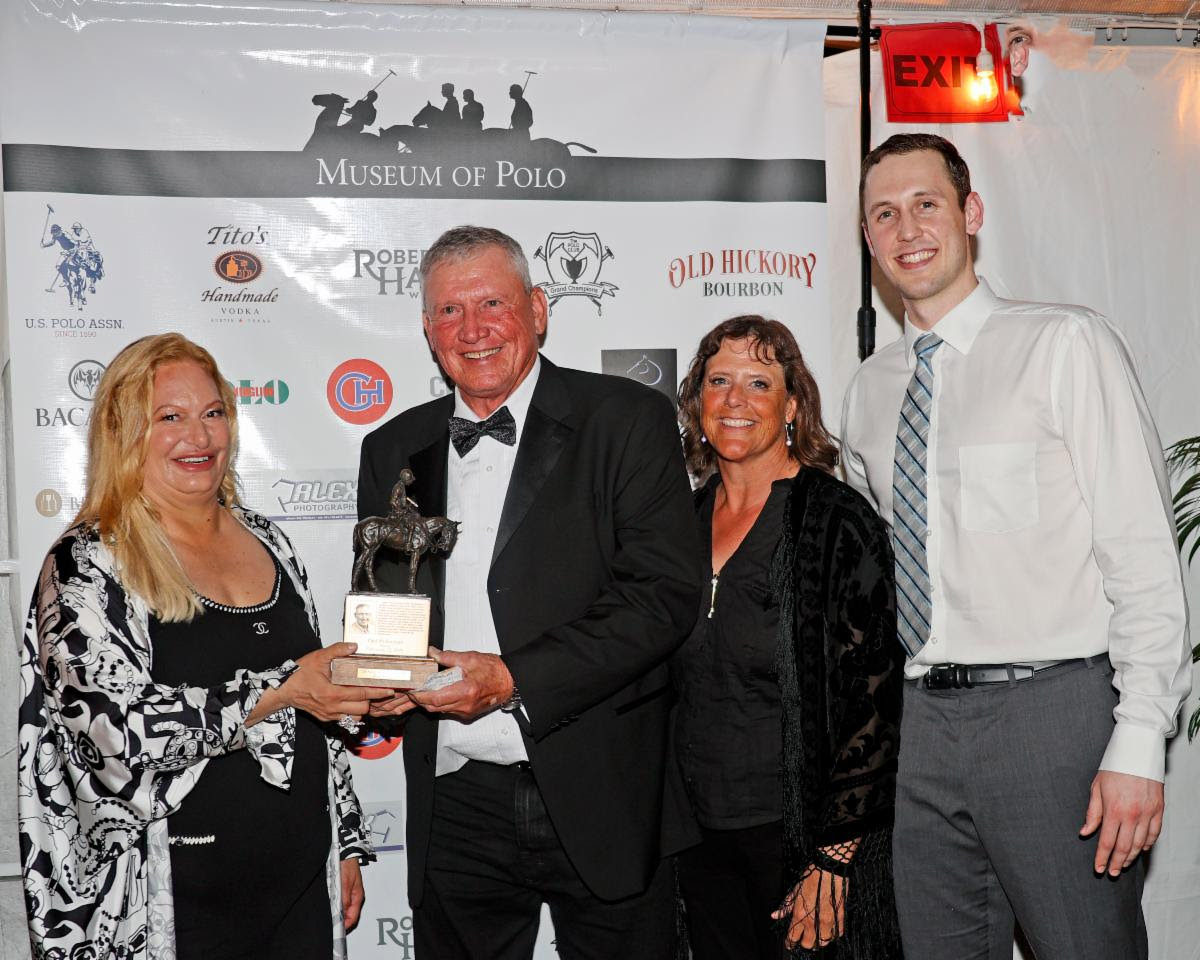
Photo by: Alex Pacheco
The Hall of Fame Induction Presentation started with awards for some of polo’s greatest equine heroes.
The first inductee for 2021 was Little Mary, owned by August Belmont and played by Larry Waterbury of “the Big Four” in the international matches against Great Britain. The famed pair helped capture Westchester Cup wins for America in 1909, 1911 and 1913 and were later immortalized on the Haseltine Bronze, commemorating the team. Accepting the “Horses to Remember” award was Penelope Pulitzer Miller a great niece of Larry Waterbury.
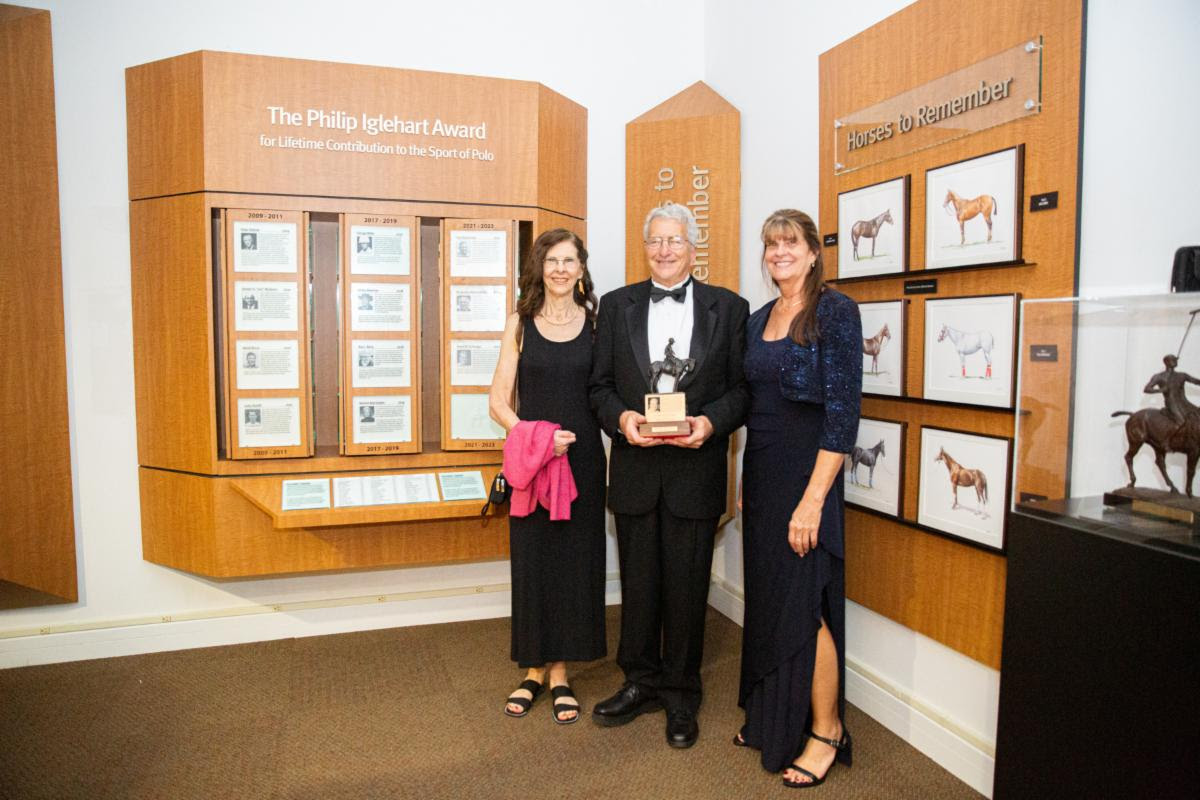
Photo by: Krystal Zaskey Photography
For 2022, Jacobs was honored. A bay gelding of note from early 1900s, Jacobs played in many prestigious tournaments throughout his 10-year polo career including international matches between the years of 1913 and 1914. He was played by polo great Devereux Milburn. This legendary duo elevated one another to the highest of their potential. Jacobs’ award was accepted by Maria-Flora Miller on behalf of the Milburn family. Interestingly, Maria-Flora’s great grandfather Harry Payne Whitney had originally owned Jacobs and gave him to Milburn as a wedding gift.
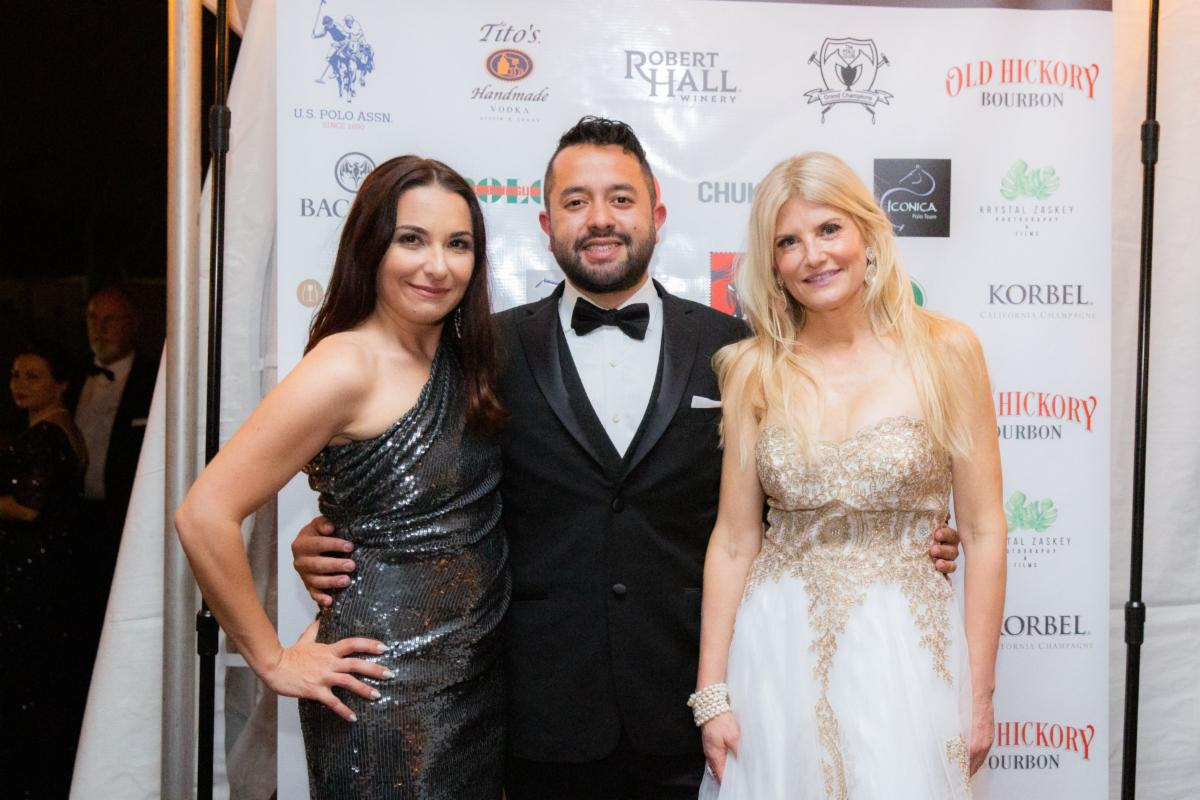
Photo by: Krystal Zaskey Photography
Anja Eckbo and her sons Justin, Landen and Benjamin Daniels stepped to the podium to accept the award for the great mare Silverada who received the Horses to Remember for 2021. Born in 1990, the Thoroughbred mare was bred to be a racehorse, but a racing career was not her destiny. She was discovered and started in polo by Judith Baker. A short time later she was purchased by Bob Daniels and played to greatness under his pro, 10 Goaler Gonzalo Heguy. In Heguy’s hands she earned numerous awards, most notably the Best Playing Pony of the 1994 East Coast Open followed by a truly triumphant moment in polo history when Silverada was awarded not only the Lady Susan Townley Cup for Best Playing Pony of the 1996 Argentine Open, but also the Best Type Mare trophy as part of the Best Mounted Player string in that ’96 series.
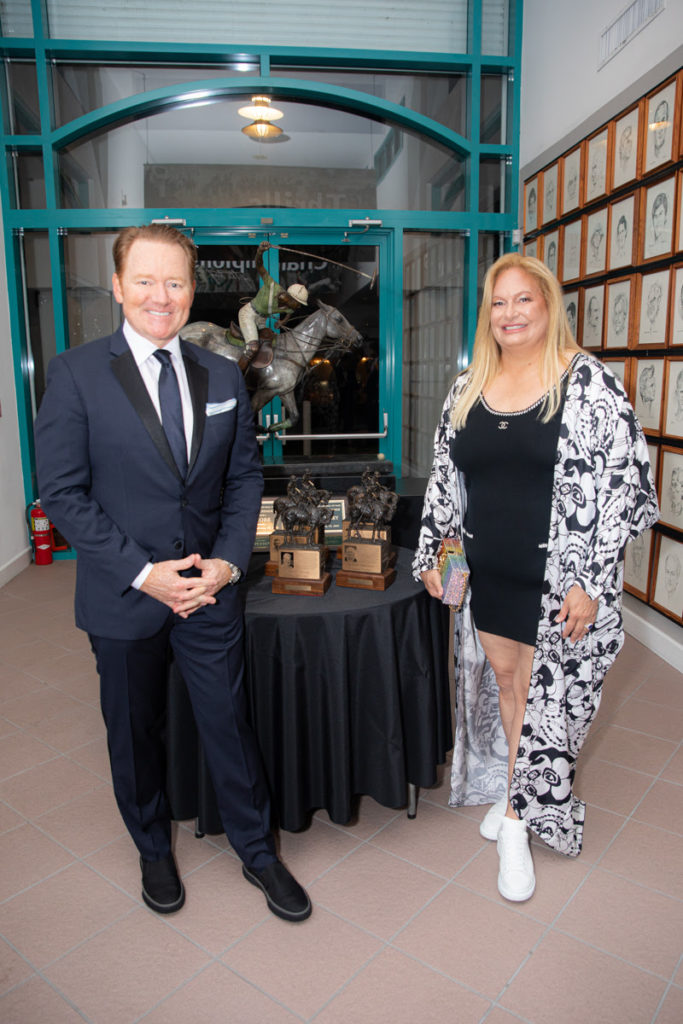
Photo by: Krystal Zaskey Photography
Charles Smith stepped forward next to accept the award for his legendary pony Cynthia Lola. She was just the kind of polo pony you would expect as an equine member of a legendary polo family. Born in 1960 the bay, thoroughbred mare was sold as a 5-year-old to Cecil Smith who was recognized as one of the finest horseman in the sport of polo. Both Cecil and his son Charles Smith knew Cynthia Lola was destined for an outstanding future. She proved it when Charles took the reins, playing with distinction in all the major American tournaments ranging from the 1968 Silver Cup to the 1975 U.S. Open, a year in which she earned the Best Playing Pony of the Silver Cup. She continued to shine over the course of eight more years of outstanding performance.
The posthumous Philip Iglehart Award winner for 2021 was Bert B. Beveridge (1902-1987). The award was accepted by his grandson, Bert “Tito” Beveridge, who was accompanied by his siblings at the podium. Starting polo in the late 1930s, Bert Beveridge remained committed for over 30 years, helping to invigorate the sport throughout the 1950s and ‘60s as it struggled to come back after WWII.
In those pivotal times Beveridge was instrumental in rejuvenating San Antonio Polo Club, keeping it alive and thriving, and went on to help found, develop and run Boca Raton Polo Club. He sponsored many teams in the major high and medium goal tournaments around the country giving several noted players their start in polo. A 3-goal player, he was remembered as a formidable Back notching major American tournament wins of the 20 Goal, the Butler National Handicap the 12-Goal Inter-circuit Cup and was a finalist in the U.S. Open.
Awarded the 2022 Philip Iglehart Award was the late Dr. Horace Laffaye, accepted by his daughter Gisele Laffaye Pansze. Laffaye left a matchless impression on the sport of polo. He grew up in Argentina, playing polo before devoting himself to medicine and becoming a surgeon. A chance encounter while treating a polo injury rekindled his interest in polo, leading him to pick up the mallet once again and enjoy playing for two more decade. After his playing days, he took his knowledge and passion for the sport and became polo’s most eminent historian. Dedicated and concise, he researched, wrote and published historical works about polo, including nine books and innumerable articles in both Spanish and English. To our lasting benefit, Laffaye served on the Board of Directors and the Nominating Committee for the Museum of Polo, helping it to grow immensely with his guidance.
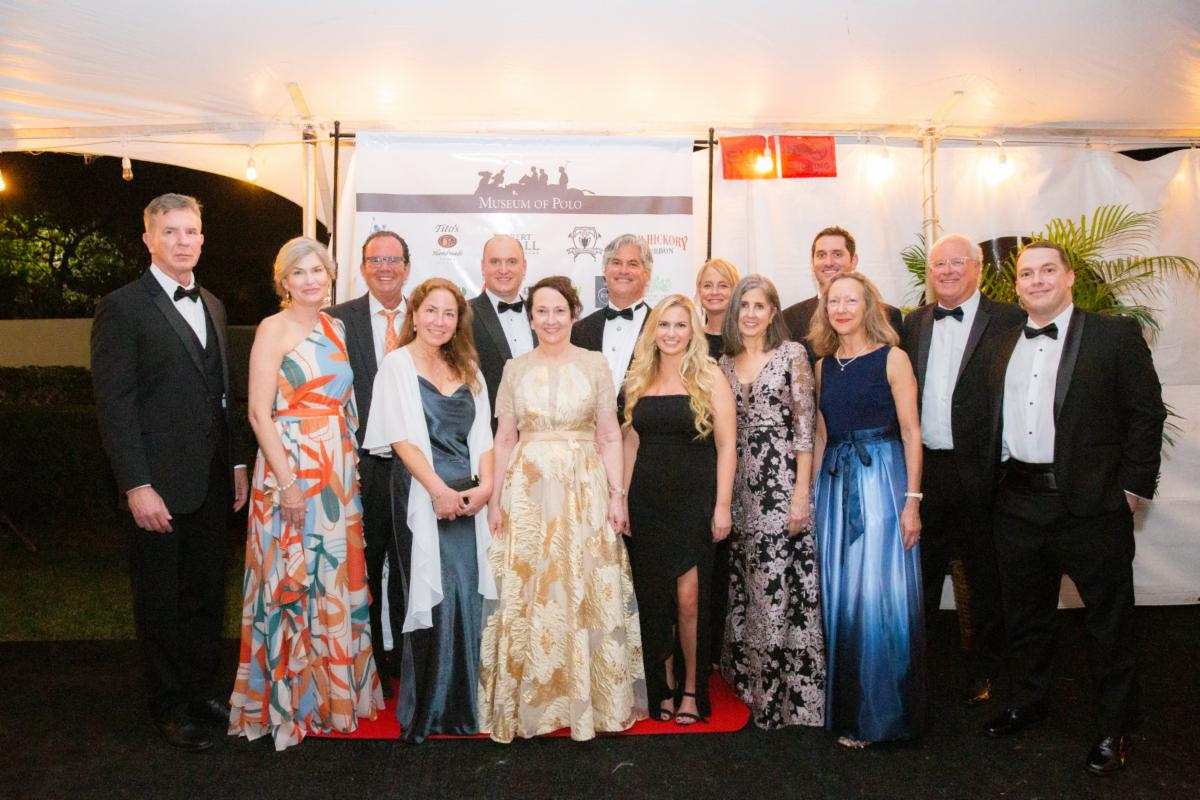
Photo by: Krystal Zaskey Photography
Earning the second 2022 Philip Iglehart Award of the night was Danny Scheraga. Scheraga played a key part in the development and mentorship of youth polo with his dedication to the sport’s Intercollegiate/Interscholastic programs. Throughout college, Scheraga played polo for Cornell University before being named head coach in 1975. Through his work with the USPA and the Polo Training Foundation, he has played a part in the advancement of youth polo and has served for 25 years as their first Executive Director.
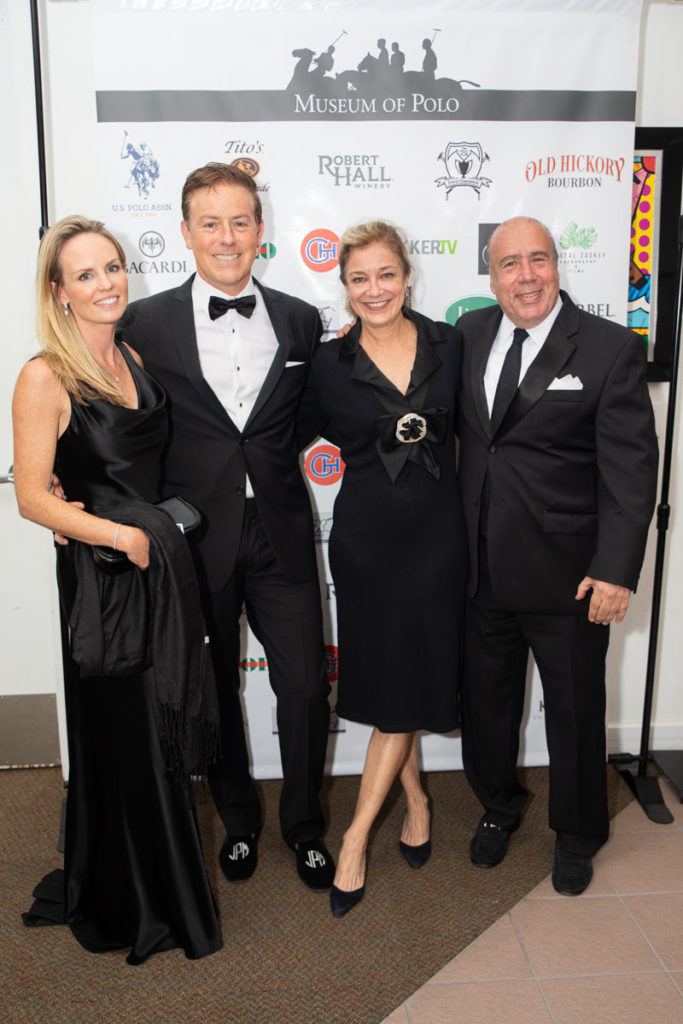
Taking the stage, Dr. Paul Wollenman accepted his Philip Iglehart Award. During a career that spans 48 years, Paul Wollenman’s expertise as a veterinarian caring for the horses of some of the nation’s finest polo teams has been an important factor in helping the sport of polo. Noted for his sound, practical advice as well as ingenious solutions to complicated injuries, he has spent most of his lifetime striving to improve the care and welfare of the horses that make polo possible. He also played polo, reaching a 2-goal handicap. Paul has served the sport by advising the USPA Equine Welfare Committee, mentoring Team USPA participants and the National Youth Tournament Series teams in Wyoming, giving lectures, and counseling young members on horse care and veterinary issues.
The first of the Hall of Fame players awards was presented for the 2021 inductee John F. “Jack” Ivory, accepted by his son Brian Ivory and other members of the family who joined him on stage. At age 10, John F. “Jack” Ivory began his polo career in the Detroit area. As a hard-hitting teenager, he was dubbed the “boy wonder” of Midwest polo. After stopping to serve in World War II, he resumed his polo career and was determined to help to revive the sport in the post-war era. Jack was best known as the fearless, hard-riding captain of the Ivory Rangers, and by 1955 he achieved a 7-goal outdoor rating and an 8-goal indoor rating. Wearing many hats during his career, Jack was a player-manager in Detroit, Chicago, Aiken, San Antonio, and Delray Beach. An energetic and innovative promoter, he worked tirelessly to make high-goal polo accessible to wider audiences around the country. Jack retired from the sport in 1993 as the “grand old man” of Michigan polo.
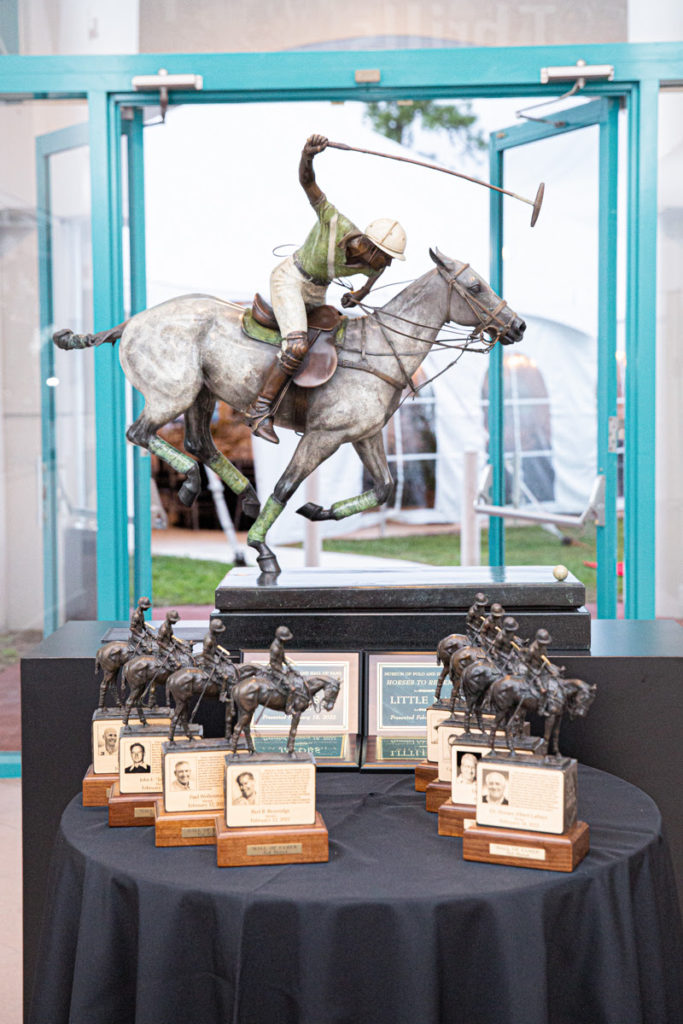
Whitney Miller Douglass received the Hall of Fame award posthumously presented to her great-uncle Cornelius Vanderbilt “Sonny” Whitney. An elite polo player, Whitney was also an American businessman, film producer, government official, writer and philanthropist. Following in the footsteps of his father, Harry Payne Whitney, Whitney took on the world of polo with full force. He acquired his father’s stable in 1930 as well as his horses and went on to make a name for himself in polo. CV Whitney achieve greatness at an international level and earned his place amongst polo’s most accomplished in the Museum of Polo’s Hall of Fame.
Julio Arellano received his Hall of Fame award in style. Arellano fought his way to the top ranks of polo, rising to a 9-goal handicap in 2003 and maintained a 7-9 goal handicap for decades. He competed in and won the most coveted major American competitions, including winning the U.S. Open Championship in 1992, 1995 and 2010 and other countless competitions such as the Gold Cup, C. V. Whitney, Monty Waterbury, Northrup Knox, Silver Cup, Butler Handicap and more. Owned by Arellano, his two mares Malia and Truse were awarded the Hartman Trophy for Best Playing ponies of the U.S. Open in 2001, 2005 and 2010.
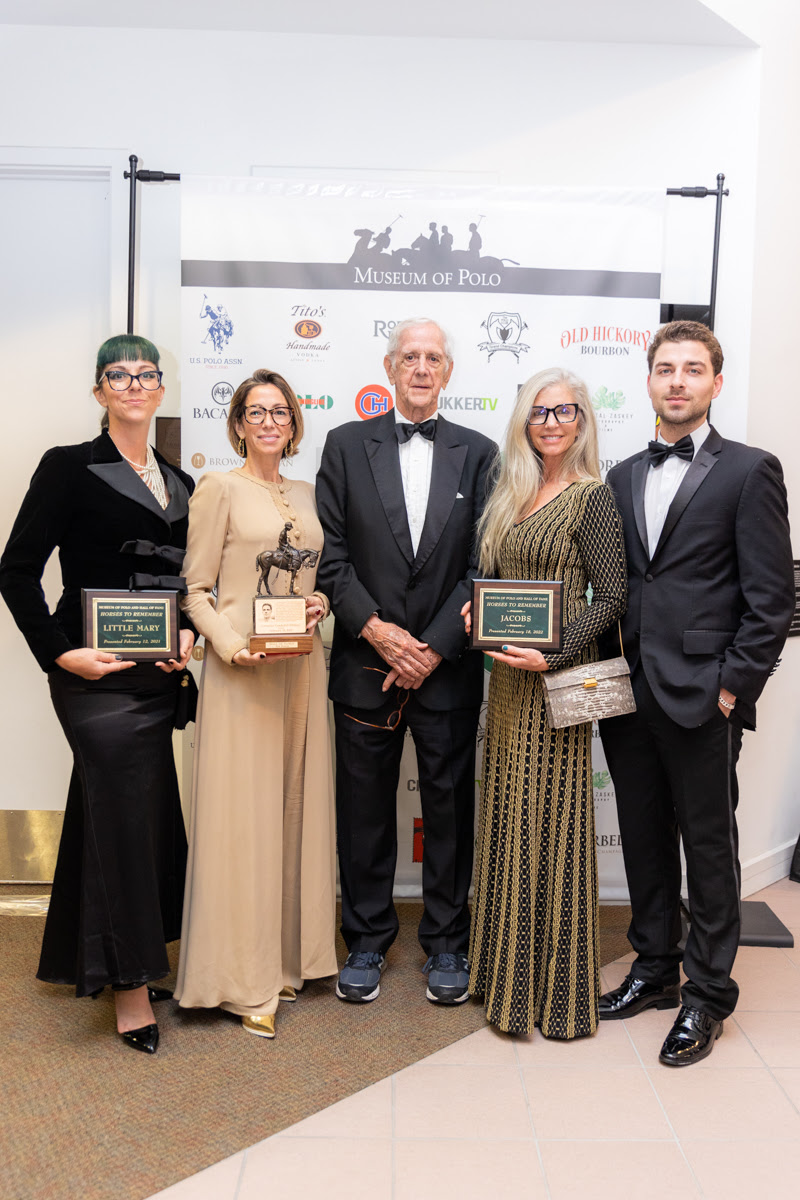
Photo by: Krystal Zaskey Photography
Wrapping up the awards for the night and earning the final Hall of Fame award was Tommy Biddle. Biddle was born into the world of polo and has devoted his entire life to the sport. Biddle is a force of nature on and off the field, standing at six feet three inches, and known as the “quickest big man to ever play the sport.” Biddle was a master of both outdoor and arena polo and perhaps one of the greatest players of all time. Some of his achievements include achieving a 10-goal rating indoors and an 8-goal rating outdoors. As a respected player on and off the field with numerous titles to his name, Biddle has rounded out his career as a highly-rated USPA Umpire.
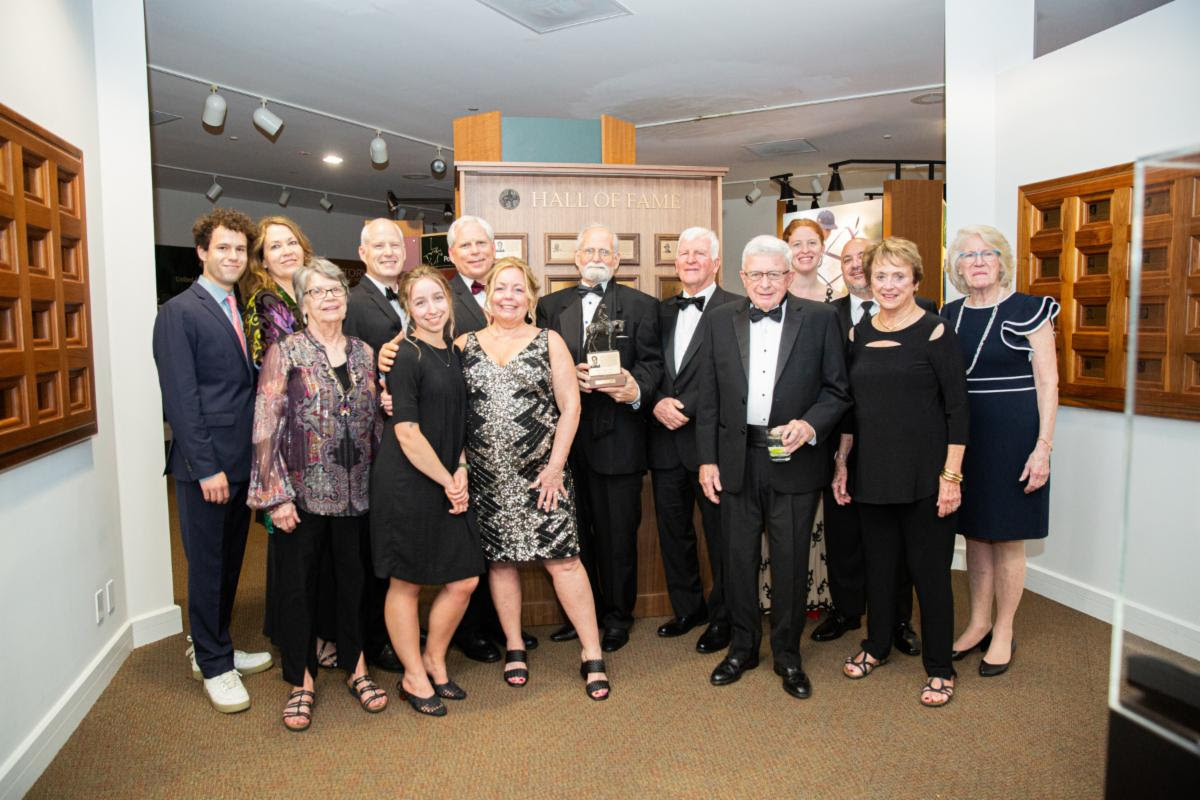
Photo by: Krystal Zaskey Photography
The Hall of Fame Dinner is the largest fundraiser for the Museum of Polo and Hall of Fame each year and would not be possible without the support of the polo community and all of the incredible sponsors. Their generosity allows the Polo Museum and Hall of Fame to continue its mission to preserve the history of polo for generations to come.
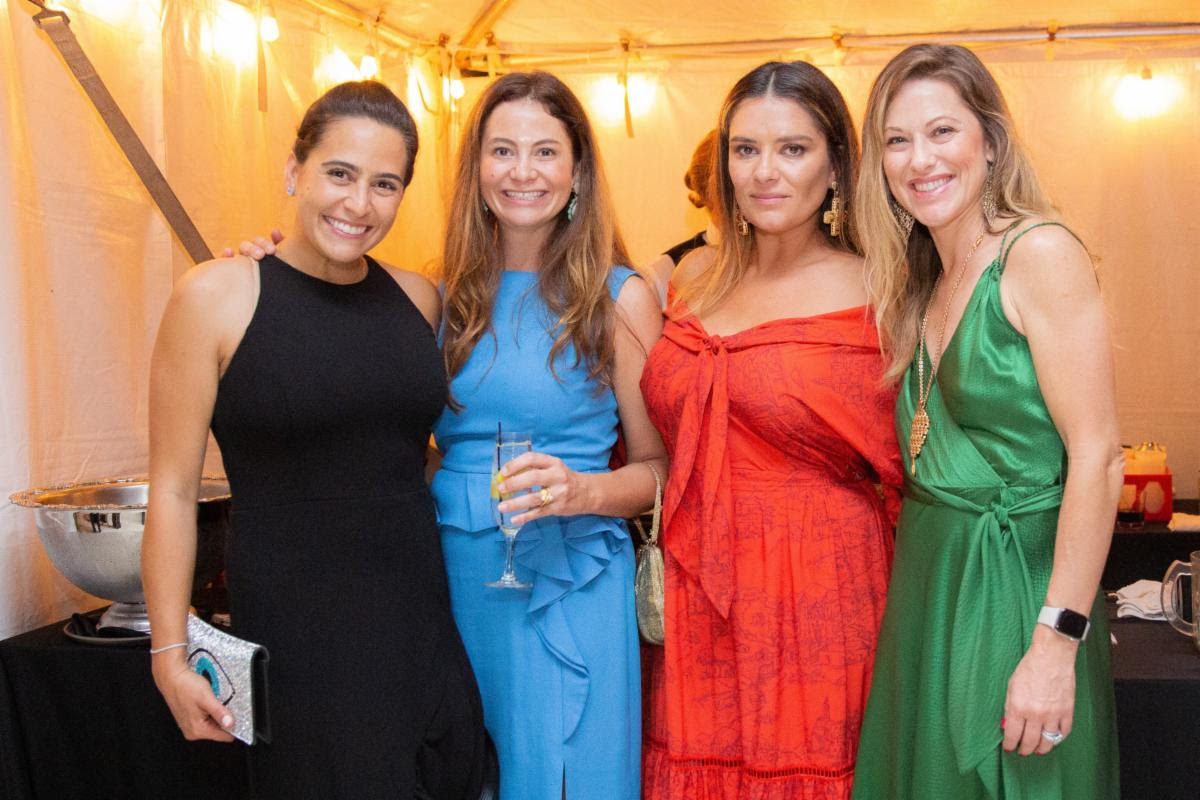
Photo by: Krystal Zaskey Photography
To view these and other photos from the Museum of Polo Hall of Fame Induction Gala courtesy of Krystal Zaskey Photography, please follow this link: Hall of Fame Gala 2022 (passgallery.com)





